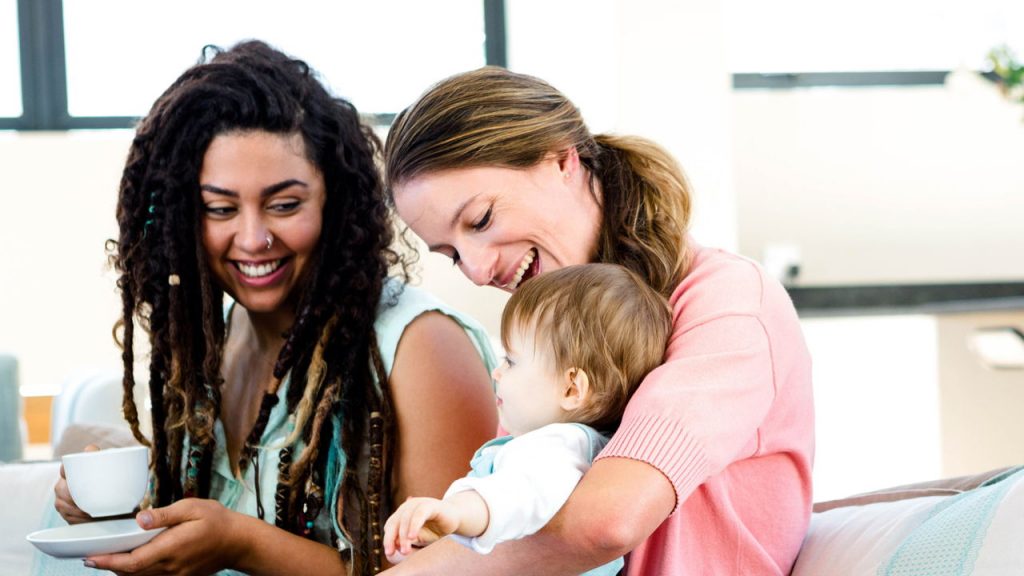I still remember sitting at my baby shower, surrounded by the people I love and a mountain of baby gear. In that moment, I naïvely thought nothing was going to change when I brought my baby home.
A few months later, I saw just how much a 6-pound human can change everything. I found myself missing things, some of them simple: sleep, showers, the ability to run to the store, a spontaneous movie with my husband. But one of the most surprising things was how my beautiful baby girl changed my friendships.
I missed people and casual conversations. I missed meeting for dinner and laughing late into the night. I missed my friends. No one prepared me for that.
One day I was standing in the kitchen when I heard a text notification from my phone. Eager to connect with someone, I picked it up and read the message. One of my girlfriends wanted to meet for coffee. My heart leapt. Yes! Coffee with my friend. I smiled wide, fingers ready to reply. Then I saw the rest. She wanted to meet in 30 minutes. I looked around and surveyed the situation.
I was in yoga pants, the same ones I had worn for three days. My hair wasn’t washed, my teeth weren’t brushed, and there was spit-up going down both sides of my shoulder. Back in the day, this wouldn’t have been my reality. And even if it were this bad, I could have rallied and pulled off a messy topknot and something resembling a trendy look. That was before.
Right on cue I heard my baby waking up from her nap, an hour earlier than expected. My mind ran a quick list of what would need to happen to meet my friend for coffee.
Get the baby up, change her diaper, nurse for 20 minutes. Then on to burping and changing her clothes. I could get all that done in 30 minutes. Sure. Absolutely. But what about me?
I was still sporting a lovely I-know-it-looks-like-I’ve-given-up-but-I’m-just-really-really-tired look. It would take me at least 30 minutes to get things looking halfway presentable. No, this impromptu coffee date just wasn’t going to work.
I heard another ding and saw that my friend texted again. A single question mark. She was looking for an answer. I hadn’t seen her since … when had it been? Was it really three months ago when she visited at the hospital? I guessed it was. And we hadn’t really talked then either. It was all about the baby.
It wasn’t always this way. We used to talk almost daily. Seeing each other a few times a week. Grabbing coffee or getting our nails done or just ordering in and bingeing on a great show. It was easy to connect then when life was so similar and we had so much time.
Now things were different. I could feel my best friend slipping away and I didn’t know how to change it. Reluctantly, I wrote my reply to her text: So good to hear from you, but I just can’t make it happen. I’m sorry.
I hit “send” and waited. My daughter’s cry from the other room grew louder. I stared at the phone, willing my friend to understand, to know how much I really wanted to say yes. Her response was quick: OK.
And that was it. Two letters in a friendship that was full of words. Maybe she was just being kind and understanding, but those two letters made me sad. I saw our friendship like a little kid who forgot to hold on to the kite string, and I had no idea how to get it back.
I put the phone down and went to my little girl, wondering how my best friend and I ended up here. Thoughts spun in my mind. I’m sure she would rather hang with women who aren’t bogged down by motherhood. Things are just so easy for her — one person — to get ready and out the door. She can’t understand. It’s just never going to be the same. Everything is different now and she just can’t see it.
I was filled with sadness over a loss I didn’t know how to rectify. Our lives had become so different. Our friendship was fading away, and I thought I was helpless to stop it.
Until I realized the real problem isn’t that our lives were now different. The real problem was I was making assumptions and judgments about my friend.
It’s so easy to believe we know what someone is thinking. Often we allow our worries and insecurities to feed those places until we think we have someone all figured out, creating the perfect foundation for developing stereotypes about one another.
When I finally opened up to my friend and told her some of what I’d been feeling, she shared her feelings. Turns out we had both been making judgments and assumptions about each other and our friendship. Many of them weren’t true, and by being honest and open, we’ve been able to build back our friendship. Sometimes we have to go first in these hard places. I’m so glad I did. It was then that she told me how she felt.
I’ve spoken to other moms and singles and discovered that drifting apart and making judgments about one another can be common, especially when one person becomes a mother. But the assumptions don’t have to define your relationship.
Here are three common assumptions friends (single women and young moms) often make about one another.
Assumption #1: Time
The new mom is thinking, She can do whatever she wants. It must be so easy without a family to only think about yourself and go! She can spend hours just getting her nails done each week. It must be nice!
The single woman is thinking, She can never do anything anymore. She must not like me because I’m not in the “mom club.” It’s like she’s too good for me. And what does she do all day anyway? How hard can it be to stay home with a little baby?!
Each person in this friendship is navigating change. The best way to combat time issues is to be open. Be honest about what works for getting together and show that time with one another is still important to you. To make time together work, find a way to be flexible given your commitments and meet in the middle.
Bridge the gap: The single woman could bring over a late lunch from a favorite restaurant, and they could catch up while the baby naps. Or the mom could meet a friend for breakfast on a Saturday while her husband stays home with the baby. The key here is showing your friend that you will make the effort, even if something small is all you can do.
Assumption #2: Appearance
The new mom is thinking, She always looks great. Her hair is done, she wears makeup and heels and I’m just hoping for a shirt that doesn’t have spit-up on it. It must be nice to look nice. I can’t see her like this.
The single woman is thinking, She always makes excuses about why she can’t get together. And when I do see her she’s always apologizing about her hair or clothes. I wish she knew that I don’t care about those things — I just want to be with my friend.
Changing roles easily causes priorities to shift. A new mom can become insecure about changes to her body as well as how she presents herself. When a single friend can understand this and find ways to reassure her, it goes a long way. The single woman can encourage honesty by reminding the new mom that the things that make her special go far beyond a pair of heels or a great blowout. Of course, the new mom needs to also be real with her friends. As much as it seems like everything has changed, how you look is not the basis for your friendship.
Bridge the gap: Go on a walk or short hike together. No one is expected to look good while exercising, right? The young mom won’t feel intimidated, and the single girl gets quality time with her good friend. Both get a workout, so everyone wins! (Getting ice cream afterward is optional. We won’t tell.)
Assumption #3: Priorities
The new mom is thinking, She talks about things that are so trivial. Here I am trying to keep a person alive, and she is worried about a second date or a wrong coffee order.
The single woman is thinking, All she talks about is her baby. It’s like she has nothing else to do and she wants to gloat that she has a baby and I don’t. I wish she would talk about “normal” stuff.
A different stage of life brings a different focus. “Normal” changes when a baby comes in the picture. It’s easy for a mom to forget that not everyone wants to know about how often you change a diaper, and single friends can often forget that this little one can be all-consuming for the mom. The more we can be mindful of the other person and the season she’s in, the more likely we are to truly connect.
Bridge the gap: Be honest and talk with your friend about how you feel. Recognizing that the things each of you talk about are important will help you both feel better. But don’t end the conversation there. Remind one another that you have a lot of things to talk about. Talk about a favorite Netflix show or where you would go on a dream vacation or how much your mom is driving you crazy. Go deeper by finding a simple Bible study to do together or a blog you both love to read and chat about that.
Ultimately, both a mom and a single friend want the same thing: To continue a lasting friendship. The best way for that to happen is to be honest with one another rather than continuing to make assumptions.
We all go through different seasons. Embracing the season you are in as well as that of your friend will go a long way toward preserving your friendship through many changes.












